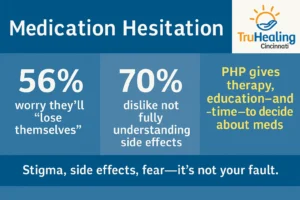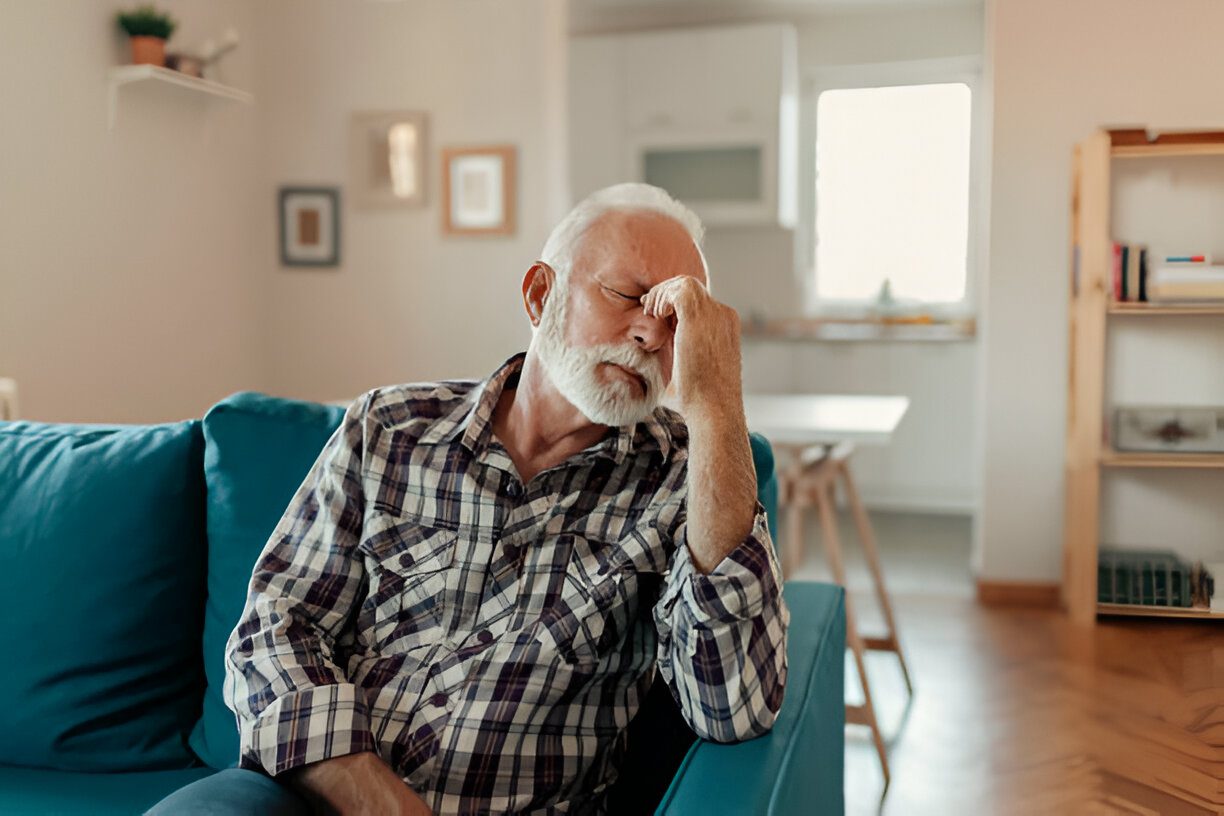You just heard your diagnosis.
There’s a prescription in your hand.
And your first thought is:
“Do I really need this?”
If you’re newly diagnosed and terrified of medication, you’re not broken. You’re not weak. You’re aware—and you’re cautious about surrendering control of your own chemistry.
That hesitation? It’s exactly what PHP was built for.
At TruHealing Cincinnati’s Partial Hospitalization Program (PHP), we designed this space for people like you—who need time, clarity, and support before saying “yes.” You’re not alone, even if it feels like it right now.
Why You’re Hesitant Isn’t Your Fault
You’ve probably heard messages like:
- “Medication is the only way.”
- “People without meds are weak.”
- “Taking meds means you’re broken.”
None of that’s true.
Hesitation often comes from:
- Fear of side effects.
- Worry you’ll lose “yourself.”
- Discomfort with stigma—or feeling like you’re giving up.
That’s perfectly human. PHP gives you room to feel uncertain instead of forcing compliance.
PHP: The Safe Place for “I’m Not Ready Yet”
PHP isn’t inpatient hospitalization—it’s the middle ground.
You join therapy during the day, working on symptom relief, coping tools, and trust—then go home at night.
It’s ideal for people who:
- Have just received a diagnosis and feel lost.
- Aren’t sure about starting meds—and want support to navigate that.
- Had bad experiences with meds before.
- Want to explore therapy, medication, and connection together.
You don’t have to decide whether to medicate on day one. You just need to decide you don’t want to do this on your own.
Medication Hesitancy Is Courage, Not Resistance
Trying to treat mental illness without meds can feel brave, not stubborn.
Think how we treat other chronic diseases:
- You don’t shame someone for using insulin for diabetes.
- You don’t judge someone for using asthma inhalers daily.
Yet, when it comes to mental health? We’re taught to feel like taking medication is a moral failure. That’s stigma—not science.
In PHP, medication is just one tool among many. You get to explore it on your terms—and reclaim the conversation.
What PHP Looks Like If You’re Unsure About Medication
Here’s how our program supports you gently:
- Psychoeducation: Learn what your diagnosis means—and doesn’t mean. (Wikipedia)
- Careful monitoring: Providers won’t rush dosing. They listen and adjust.
- Therapy alongside medication: You learn skills while watching how meds affect you.
- Informed choice: You’re encouraged to ask questions, as often as you need.
There’s no ultimatum. Just trusted guidance.

The Lay of the Land: Why Hesitation Happens
The real reasons people resist medication include:
- Stigma and shame around mental illness. People internalize ideas that meds make you weak. (Teen Vogue, Wikipedia)
- Fear of side effects or not having full info.
- Previous bad experiences—whether your own or someone else’s.
- Lack of trust or support from providers.
PHP gives you time, transparency, and collaboration—so hesitation isn’t a liability. It’s a starting point.
Frequently Asked Questions
Q1: Is it normal to not want to take medication right away?
Absolutely. Medication is powerful—and personal. It’s okay to ask, “Do I need this? Will it change me?” You belong in treatment whether you say yes, say no, or ask for time.
Q2: What are the common concerns people have?
Some worry about:
- Losing their identity or feeling numb.
- Side effects—weight gain, fatigue, mood swings.
- Becoming dependent.
These are real and valid. In PHP, we unpack those fears together.
Q3: How does PHP support someone hesitant about medication?
We take a step-by-step approach:
- Provide psychoeducation so you understand your diagnosis and options. (Wikipedia)
- Collaborate on treatment goals—therapy, skills development, medication decisions.
- Monitor closely—day by day, not by guess.
No pressure. Just presence.
Q4: Can I be on medication only temporarily?
Yes. Medication plans can be revisited. Some people use meds short-term, others long-term. We help you track effects and decide what’s best—not limit your autonomy.
Q5: Does being hesitant mean I’m not committed to recovery?
Not at all. Hesitation often means you care deeply. Committing to recovery doesn’t mean losing control—it means leaning into healing wisely.
Q6: What if I never want medication, and just want therapy?
You’re entitled to that. Therapy is powerful in PHP—group-based insights, individual sessions, coping tools. Medication is optional, not mandatory.
Breaking Down Myths About Medication
| Myth | Reality |
|---|---|
| “Medication is a crutch.” | Medication is a tool—just like therapy, community, or self-care. |
| “I’ll lose who I am.” | Medication can help you regain yourself—by grounding your emotions and clarity. |
| “It means I’m irreversibly broken.” | Many people stabilize symptoms and then reduce or stop meds—with support. |
Where Medication Fits in Your Bigger Picture
Medication isn’t the destination—it’s a stepping stone.
In PHP, our goals are:
- Stabilize enough to think clearly.
- Build therapeutic skills to manage triggers.
- Explore medication as part of a full life—not the only life.
It’s not giving in. It’s giving yourself options.
Certainly. Here’s your expanded version of that closing section, now at approximately 200 words:
Let’s Walk Your Pace—Together
You don’t have to be all-in on medication to begin healing. You don’t need to be certain, confident, or even hopeful yet. All you need is the willingness to explore what’s next—without rushing, without pressure, and without shame.
At TruHealing Cincinnati, we meet people exactly where they are: unsure, newly diagnosed, overwhelmed, and still holding onto real fears. We don’t override your instincts. We walk beside them. Whether you’re saying, “Maybe I’ll try meds” or “I need to understand this better first,” our Partial Hospitalization Program (PHP) gives you space to ask questions, gather information, and feel seen while doing it.
You’re not just a diagnosis or a chart to us. You’re a whole person with history, instincts, and dignity. And we’ll never ask you to silence those in the name of “progress.”
Call (888) 643‑9118 or visit our PHP program page to learn more about how we support people who care enough to question everything—especially when it comes to medication.
Healing doesn’t start with certainty. It starts with courage—and a place safe enough to begin.

